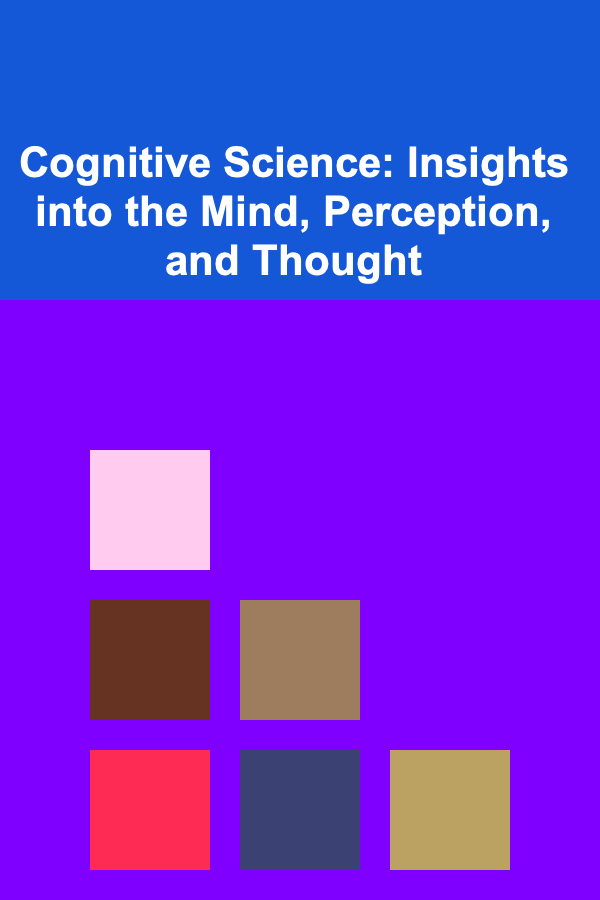
Cognitive Science: Insights into the Mind, Perception, and Thought
ebook include PDF & Audio bundle (Micro Guide)
$12.99$5.99
Limited Time Offer! Order within the next:

Cognitive science is an interdisciplinary field that seeks to understand the nature of the mind, how it processes information, and how it leads to behavior. This field blends insights from psychology, neuroscience, philosophy, linguistics, anthropology, and artificial intelligence to build a comprehensive picture of human cognition. By studying cognition, researchers aim to uncover the mechanisms underlying perception, thought, memory, learning, language, and decision-making. In this article, we will explore the fundamental concepts of cognitive science and offer actionable insights into how we can apply these principles to better understand our minds, enhance cognitive performance, and improve our interactions with the world.
Understanding the Mind: Cognitive Processes and Mechanisms
At the core of cognitive science lies the study of cognitive processes---those mental activities that allow us to perceive, reason, remember, and make decisions. These processes can be broadly classified into several categories, each of which contributes to our overall experience of the world.
1.1 Perception: The Process of Interpreting Sensory Information
Perception is the process by which we interpret sensory data from the environment to form an understanding of the world around us. Our senses---sight, hearing, touch, taste, and smell---provide raw data, but it is our brain that processes and makes sense of this information. Cognitive scientists have found that perception is not just a passive reception of sensory data but an active process influenced by attention, experience, and context.
Actionable Tip:
To enhance perception, try to engage in mindfulness practices. Being present in the moment can help sharpen sensory awareness and improve attention to detail. Additionally, training your brain to focus on specific aspects of your environment (like color or texture) can improve your ability to pick out subtle details that might otherwise go unnoticed.
1.2 Attention: The Gateway to Cognition
Attention is a key cognitive resource that determines what information from the environment we focus on and process. Cognitive science has shown that attention is limited and selective; we cannot pay attention to everything at once. Instead, we focus on certain aspects of our environment, while ignoring others. Theories of attention, such as the "filter theory" and the "resource theory," explain that our brains use mechanisms to filter out irrelevant stimuli and concentrate cognitive resources on tasks that are important.
Actionable Tip:
To improve attention, practice tasks that challenge your focus, such as meditation or exercises that require sustained concentration. You can also minimize distractions in your environment to boost attention capacity. Organizing your workspace or using tools like the Pomodoro Technique can help manage focus over time.
1.3 Memory: Storing and Retrieving Information
Memory is the system by which we store, retain, and recall information. Cognitive scientists differentiate between different types of memory, including sensory memory, short-term memory (also known as working memory), and long-term memory. Each type of memory has its own capacity and duration, and each plays a unique role in cognition.
Actionable Tip:
To enhance memory, use strategies such as chunking (grouping information into larger, meaningful units) and spaced repetition (reviewing information at increasing intervals). Additionally, techniques like creating mental associations and visualization can help solidify long-term memories.
1.4 Reasoning and Decision-Making: How We Think and Choose
Reasoning is the process by which we draw conclusions from available information, while decision-making involves choosing among different options based on those conclusions. Cognitive scientists have identified various types of reasoning, such as deductive and inductive reasoning, and decision-making processes like heuristics and biases. While heuristics (mental shortcuts) often help us make quick decisions, they can also lead to cognitive biases---systematic errors in judgment.
Actionable Tip:
To improve decision-making, it is crucial to be aware of biases such as the anchoring effect or confirmation bias. Developing a habit of questioning assumptions and considering multiple viewpoints before making decisions can help overcome these biases. Tools like decision matrices or pros-and-cons lists can also aid in more structured and rational decision-making.
The Cognitive Architecture: How the Mind Works
The cognitive architecture refers to the underlying structure and organization of the mental processes that drive cognition. Cognitive science has developed models to describe how these processes are integrated into a coherent system. One such model is the Information Processing Model, which compares the brain to a computer, where information is input, processed, and output.
2.1 Theories of Cognitive Architecture
One influential theory in cognitive science is the "connectionist model," which posits that cognition arises from networks of simple units (neurons) that are interconnected. This model is consistent with findings from neuroscience, which show that the brain's neurons are highly interconnected and communicate via electrical signals.
Another important model is the "modular mind" theory, which suggests that different cognitive processes are handled by distinct areas of the brain. For example, language processing occurs in the left hemisphere, while spatial reasoning is typically processed in the right hemisphere.
Actionable Tip:
Understanding how the brain processes information can help you optimize your learning and problem-solving strategies. For example, the brain's natural propensity for pattern recognition means that engaging in activities like puzzles, games, and creative exercises can strengthen neural connections and enhance cognitive flexibility.
2.2 The Role of Emotions in Cognition
Cognitive science has increasingly recognized the role of emotions in shaping thought processes. Emotions are not merely reactions to external stimuli, but they influence attention, memory, and decision-making. For instance, positive emotions can improve creativity and problem-solving, while negative emotions like anxiety can impair cognitive performance.
Actionable Tip:
To improve cognitive performance, consider how your emotions may be influencing your thinking. When experiencing stress or negative emotions, engage in emotional regulation techniques like deep breathing, journaling, or physical exercise to restore emotional balance and improve cognitive functioning.
Cognitive Development: How Our Mind Changes Over Time
Cognitive development refers to the changes in cognitive abilities and processes as individuals age. Cognitive scientists explore how children acquire knowledge, language, and problem-solving abilities, as well as how these abilities evolve throughout life.
3.1 Piaget's Stages of Cognitive Development
Jean Piaget, one of the pioneers of cognitive science, proposed that children progress through four stages of cognitive development: sensorimotor, preoperational, concrete operational, and formal operational stages. These stages reflect increasingly complex ways of thinking about the world, from simple sensory experiences to abstract reasoning.
Actionable Tip:
Understanding Piaget's stages can help you better support cognitive development in children. By providing age-appropriate learning experiences that challenge their current cognitive abilities, you can stimulate their intellectual growth. For adults, engaging in lifelong learning activities can help maintain cognitive flexibility and adaptability.
3.2 Adult Cognitive Development and Neuroplasticity
While Piaget's theory focuses on childhood development, research has shown that cognitive development continues throughout adulthood. Neuroplasticity, the brain's ability to reorganize itself by forming new neural connections, allows adults to learn new skills, adapt to changing environments, and recover from brain injuries.
Actionable Tip:
Engage in activities that promote neuroplasticity, such as learning new languages, playing musical instruments, or solving complex problems. These activities help the brain form new connections and improve cognitive reserve, which can mitigate age-related cognitive decline.
Artificial Intelligence and Cognitive Science
In recent years, artificial intelligence (AI) and cognitive science have increasingly intersected. AI researchers are using insights from cognitive science to build machines that mimic human cognition, while cognitive scientists are using AI to model and simulate cognitive processes.
4.1 Cognitive Models in AI
One major area of AI research inspired by cognitive science is the development of cognitive models, which are computational representations of human cognitive processes. These models aim to replicate human-like reasoning, learning, and decision-making in machines. For example, neural networks, which are inspired by the brain's structure, are being used in deep learning algorithms to make decisions based on large datasets.
Actionable Tip:
While AI continues to evolve, it can provide valuable insights into human cognition. Using AI tools, such as machine learning algorithms, can help improve tasks like data analysis, decision-making, and pattern recognition, both in personal and professional contexts.
4.2 Cognitive Science and Human-AI Interaction
Understanding how humans interact with AI is crucial for creating effective AI systems. Cognitive science provides insights into how people perceive and interact with machines, how they trust technology, and how to design AI interfaces that are intuitive and user-friendly.
Actionable Tip:
When interacting with AI technologies, it is important to be mindful of how the system is influencing your decisions. Understanding the algorithms behind AI recommendations or using AI tools in ways that complement human judgment can help you make more informed, balanced choices.
Conclusion: Harnessing Cognitive Science for Personal Growth
Cognitive science offers a wealth of insights into how we think, perceive, remember, and decide. By understanding the cognitive processes that underlie our behavior, we can enhance our cognitive abilities, improve decision-making, and foster healthier, more productive mental habits. Whether through mindfulness, emotional regulation, or embracing lifelong learning, the principles of cognitive science provide actionable strategies for optimizing mental performance. As we continue to unravel the mysteries of the mind, cognitive science will undoubtedly remain a powerful tool in helping us understand and unlock the full potential of human cognition.

How to Build a Financial Cushion for Life's Unexpected Events
Read More
How to Create a Stylish Home Office on a Budget
Read More
How to Organize Medical Records for Family Health Management
Read More
How to Save for Big Home Purchases in Your Budget
Read More
The Benefits of Wholesale Shopping: Why Buying in Bulk is a Smart Choice
Read More
Top Ways to Start Saving on Home Energy Bills Today
Read MoreOther Products

How to Build a Financial Cushion for Life's Unexpected Events
Read More
How to Create a Stylish Home Office on a Budget
Read More
How to Organize Medical Records for Family Health Management
Read More
How to Save for Big Home Purchases in Your Budget
Read More
The Benefits of Wholesale Shopping: Why Buying in Bulk is a Smart Choice
Read More